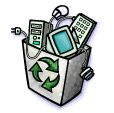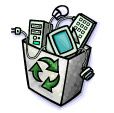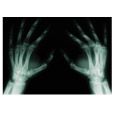


Many commonly used equipment and related materials contain hazardous components which are prohibited from normal trash discarding, and must be recycled. The college has established various recycling programs to assist in the proper recycling of these materials.
Batteries

All batteries, including alkaline, lead acid, lithium, nickel cadmium and zinc oxide, are collected by EHS for recycling.
Computers and Other Electronics
Computers and other electronics with circuit boards contain high levels of toxic heavy metals (e.g., lead, silver) that must be properly managed and recycled via EHS. All computers and electronics containing circuit boards must remain in a secure location until disposed.

- Locations serviced by WCM E&M: Submit a work order to WCM Facilities Management and Campus Operations to have electronics collected for recycling.
- Locations not serviced by WCM E&M: Contact EHS to arrange for the removal of electronics from your location. Provide location, contact information, and inventory of electronics.
Light Bulbs
Certain light bulbs and lamps may contain toxic metals such as mercury which require special disposal.

Common examples of universal waste lamps include, but are not limited to, fluorescent, high intensity discharge (HID), neon, ultraviolet (UV), mercury vapor, high pressure sodium and metal halide. These types of light bulbs must be properly managed and recycled via EHS. Regular incandescent light bulbs are approved for regular trash disposal. Please containerize these bulbs into cardboard boxes to prevent injuries to staff during disposal.
Films Containing Silver
Photographic film and x-ray film may contain silver which must be properly managed and recycled via EHS.

Lead
Lead is found and/or utilized throughout the college. The two main sources of lead are radiation shielding materials (e.g., lead aprons and bricks), and maintenance and construction projects (e.g., old piping and lead paint). Lead waste must be properly managed and recycled via EHS.
Mercury Devices (Manometers, Thermometers, Thermostats)
Sources of mercury include medical instruments like sphygmomanometers, thermometers and gastrointestinal tubes. Non-mercury alternatives must be used where available. Mercury must be properly managed and recycled via EHS.
Related Links
- Chemical Collection Request Form
- Engineering & Maintenance Service Request
 Waste Disposal Procedures
Waste Disposal Procedures Pollution Prevention and Waste Minimization
Pollution Prevention and Waste Minimization Battery Recycling
Battery Recycling Computers and Electronics Recycling
Computers and Electronics Recycling Films Containing Silver for Recycling (Photographic Films and X-Ray Films)
Films Containing Silver for Recycling (Photographic Films and X-Ray Films) Lead Recycling
Lead Recycling Light Bulb Recycling
Light Bulb Recycling- Other Waste Manuals and Guides

